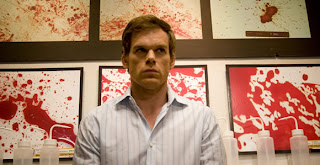During the late 1990s and the earliest years of last decade, the North American box office saw the strongest years of attendance since the early 1980s, when they had started publicly calculating box office totals. Since then, the number of receipts tallied has dropped considerably (in 2008, there were nearly 250 million fewer tickets sold than in 2002, the most attended year on record).
Box office analysts were keen to jump on reasons for this sudden decrease: the lack of original ideas coming from Hollywood boardrooms (despite a more crowded marketplace); the DVD format making the home-viewing experience a formidable one; and, the obscene climb in ticket prices.
During this period of box office remiss, a different format was experiencing a hefty rise. Throughout the last ten years, the quality of network and cable television programming has catapulted, elevating storytelling and craftsmanship to levels rarely seen in any medium of entertainment.
Perhaps audiences who would normally spend their time at the local multiplex were finding a better and more diverse set of options in comedy, drama and suspense on the small screen.
Just in time for the beginning of a new season of television, here's some friendly advice to give film writers, producers and directors, on how their films can learn from the narrative and creative merits of television's finest shows.

Here's What Hollywood Can Learn About Comedy from Modern Family:
--- Jokes and situations don’t have to be mean-spirited to be funny. You can "poke fun" at common stereotypes without "making fun."
--- Kids can be funny, too. So can women.
--- Single life may seem glamorous to those behind raunchy comedies, but married life can capably pack in comedy bit after comedy bit without becoming tiresome.
--- Don’t overload scripts with secondary characters that have little purpose. If you have an excellent ensemble, just stick with them. They’re all you need.
--- Don't force situational comedy. Let it flow naturally from within the scene or sequence. We don't see the comic scenario coming a mile away if the main point of the scene is to advance the narrative and not to provide a mere backdrop for the amusements.
Modern Family returns for Season #2 on Wednesday, September 22.

What Hollywood Can Learn About Crime Thrillers from Dexter:
--- Investigators and police officers are much more fascinating if they have a dark side.
2) --- Raise the stakes. The more conflict and dramatic tension there is, the more we learn about the characters and more investment we have in the story. We'll stick with your story if we're eager to see where things are going.
3) --- Not all crime scenes will get results right away, and most don't. Long, wieldy investigations with a lot of red herrings can keep the characters – and the audience – on their toes.
4) --- Don’t be afraid to test the audience’s moral compass. On Dexter, we’re rooting for a criminal to prevail, hoping that nobody will discover his secret identity.
Dexter returns for its fifth season on Sunday September 26.

What Hollywood Can Learn About Kids’ Films (or Films Featuring Young Actors) from Glee:
1) --- So many films and television series angled toward children have a bland, homogenized depiction of young adults. All kids are interesting, so all young characters need to extend beyond the cliches normally attributed to them.
2) --- Teachers are among the most inspiring figures in a child’s life. That fact can be expressed on film, too.
3) --- Kids are curious and know a lot about more adult matters (sex, for instance) than many would suspect. So don’t condescend to young audiences with naïve characters and squeaky-clean subject matter.
--- Being a kid is fun. The tone of the production should then be cheery, charming, and maybe even a wee bit cheesy.
--- Kids have heard the "be true to yourself' message a million times before. But there are ways to present it in an inventive and engaging way (through pop songs, for instance).
The 2nd season of Glee premiered on Tuesday September 21.

What Hollywood Can Learn About Dramatic Narrative from Friday Night Lights (currently, my favourite program still on the air):
1) --- Without conflict, there is no tension, no action and no reason for a character to change or develop. The more conflict you have, the more absorbed an audience will be in the story and in the protagonist.
2) --- It’s all fourth downs for many of the characters on FNL. Then again, the more difficult and agonizing it is for one to achieve their own personal victory - either on or off the field - the sweeter that victory is.
3) --- The United States is full of vibrant communities. Metropolitan areas have little left to offer on the big screen while small middle-America ruralities can paint a blisteringly powerful portrait of life at the current moment. These places all have stories to tell.
4) --- Don’t be afraid to tackle family drama. Done right, it can be the most brutally honest material in a dramatic narrative.
5 ---- Avoid glamour and romanticism. The characters on FNL are conflicted even before the episode’s central conflicts come into play. There’s little money to go around. As a result, they don’t always do the right thing. They sacrifice doing what’s enjoyable for doing what’s necessary.
Friday Night Lights returns to DirecTV on October 27, and will air on NBC next spring. It will be the show's 5th and final season.


No comments:
Post a Comment